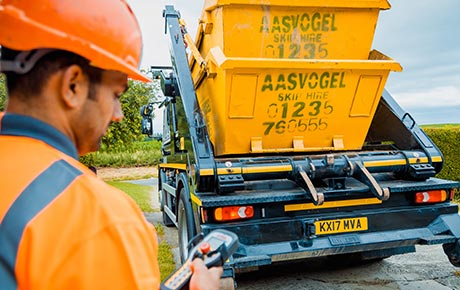Hiring a skip is a convenient and efficient way to manage waste for projects such as home renovations, garden clearances, or during a big spring clean in Oxford.
One common problem is when people use someone else’s hired skip without permission. This can lead to extra waste being added or the skip being filled up too quickly. Below, we go through the essentials of skip hire in Oxford and, importantly, how to prevent others from using your skip.
What are the rules for skips in Oxford?
1.Permits and Regulations:
In Oxford, if you plan to place your skip on public land, including roadsides, you’ll need a permit from the Oxford City Council.
You can arrange this when hiring your skip, but it’s crucial to be aware of this requirement to avoid any legal issues. Local regulations may dictate the placement, duration, and even the type of waste allowed in your skip, so familiarising yourself with these rules is essential. It can also add a few days to your order, so factoring this into your
2.Acceptable Waste:
Skips are versatile and can accommodate a wide range of waste types, from construction debris and household items to green waste. However, certain materials are prohibited, including hazardous waste (like asbestos), electrical appliances, tyres, and batteries, due to environmental and health risks.
Who is responsible if someone else puts unaccepted waste in my skip?
At the end of the day, you are responsible for the waste in your skip. This is why ensuring that no one uses your skip without your knowledge or permission is important.
If it is found that your skip has unaccepted waste in it, your skip hire firm may refuse to accept it, costing you time and money to get rid of waste that wasn’t yours in the first place.
Is it illegal to use someone else’s skip?
The short answer is, yes, it is illegal to use someone else’s tip, and it counts as flytipping. Flytipping is a serious and costly crime and can lead to fines of up to £50,000 or even a prison sentence.
The difficulty comes from finding and prosecuting the person who has fly-tipped; evidence can be hard to come by, so often prevention is the best cause of action.
How do I stop people from putting things in my skip?
To combat the frustration of unauthorised dumping, consider the following strategies:
1. Strategic Placement:
Placing your skip within private property boundaries significantly reduces the risk of unauthorised use; this can include behind a temporary barrier, such as a fence, making it harder for members of the public to gain access to your skip.
If you are positioning a skip on public land, try and place it in a well-lit, visible area that can act as a deterrent. Always ensure your placement adheres to local regulations and does not obstruct public access.
2. Signage and Warnings:
Clear signage indicating that the skip is private property and warning against unauthorised use can be effective. Highlighting the potential legal penalties for illegal dumping can also prevent dumping.
3. Covering:
Using a deterrent such as a tarpaulin can be a simple but effective way of stopping people from dumping their rubbish in your skip. You can fix it in place by using a few heavy items, such as bricks or rope, if it has eyelets around the outside.
4. Monitoring and Reporting:
In areas prone to unauthorised dumping, consider the use of surveillance cameras. Additionally, knowing how to report incidents of unauthorised use to local authorities or your skip hire company can ensure swift action is taken.
5. Fill it up fast
The best deterrent to fly-tipping in your skip is to be ready to fill it up fast. This means getting everything in place to fill up your skip before someone else does. This can mean getting a skip halfway through a job or at the end. The longer your skip sits there the more chance that people will try and take the opportunity to dump their rubbish in there.
Types of Skips
At Aasvogel, we offer a few different types of skips in a range of sizes, from mini skips to the most common 6-yard skips to larger 10-yard skips for bulkier lightweight items such as house clearances.
1. Open Top Skips:
These are the most common or ‘traditional’ skips you will see. They have shallow ends, making them easy to load. These skips also allow you to stack items slightly higher than the side of the skips, giving you the
2. Covered Skips:
Opting for a covered skip can be a game-changer. These skips come with lockable lids, offering a dual advantage of securing the skip’s contents against unauthorised access and protecting it from the elements. This option is highly recommended for those placing skips in publicly accessible areas.
3. Drop End Skips:
Primarily designed for ease of loading, drop-end skips can also deter unauthorised dumping due to their structure. Though more secure than covered skips, their design can make casual dumping less convenient.
By making sure you have the right type of skip and taking proactive measures to secure it, you can significantly reduce the risk of unauthorised dumping. We at Aasvogel have worked tirelessly to become one of the best skip-hire companies in Oxford. If you want any advice about removing waste from your project, whether it be skip hire, caged tipper pick up, or hazardous waste materials, our specialist team members will be happy to help.



